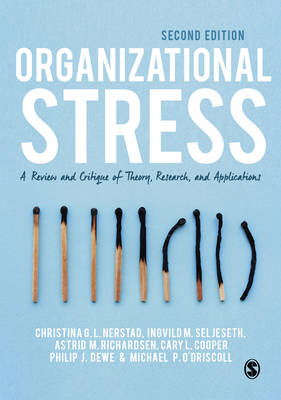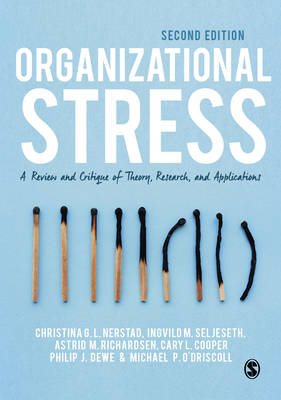
- Afhalen na 1 uur in een winkel met voorraad
- Gratis thuislevering in België vanaf € 30
- Ruim aanbod met 7 miljoen producten
- Afhalen na 1 uur in een winkel met voorraad
- Gratis thuislevering in België vanaf € 30
- Ruim aanbod met 7 miljoen producten
Organizational Stress
A Review and Critique of Theory, Research, and Applications
Christina G L Nerstad, Ingvild M Seljeseth, Astrid M Richardsen, Cary L Cooper, Philip J Dewe, Michael P O′driscollOmschrijving
What price do organizations and nations pay for a poor fit between employees and their work environments?
Negative stress imposes a high cost on individual health and well-being as well as organizational health and productivity. This comprehensive textbook examines the definitions of job-related stress and the methods used to assess levels and consequences of occupational stress, along with strategies that may be used by individuals and organizations to confront negative stress and its associated problems.
From sources of stress to organizational interventions, and from job-related burnout to coping with stress, Organizational Stress gives the reader - whether researcher, student, or practitioner - a basis for tailoring work environments which contribute to the health and well-being of individuals, organizations, and even the societies in which they live.
This new edition has been updated to reflect the most relevant research in the field of organisational stress, including a completely new chapter on stress and the brain. It also focusses on the future of work in our rapidly changing world - dealing with contemporary contexts such as the COVID-19 pandemic and the rise of the gig economy.
Christina G.L. Nerstad is a Professor at BI Norwegian Business School
Ingvild M. Seljeseth is an Associate Professor at Kristiania University College
Astrid M. Richardsen is Professor Emerita at BI Norwegian Business School
Cary L Cooper is a Professor at Alliance Manchester Business School
Philip J. Dewe is Emeritus Professor at Birkbeck, University of London
Michael P. O′Driscoll is Emeritus Professor at University of Waikato
Specificaties
Betrokkenen
- Auteur(s):
- Uitgeverij:
Inhoud
- Aantal bladzijden:
- 296
- Taal:
- Engels
Eigenschappen
- Productcode (EAN):
- 9781529724721
- Verschijningsdatum:
- 23/05/2023
- Uitvoering:
- Hardcover
- Formaat:
- Genaaid
- Afmetingen:
- 170 mm x 244 mm
- Gewicht:
- 662 g

Alleen bij Standaard Boekhandel
Beoordelingen
We publiceren alleen reviews die voldoen aan de voorwaarden voor reviews. Bekijk onze voorwaarden voor reviews.











